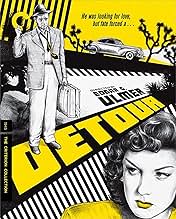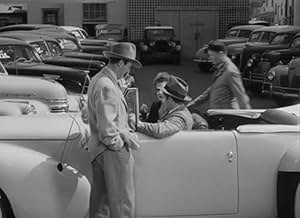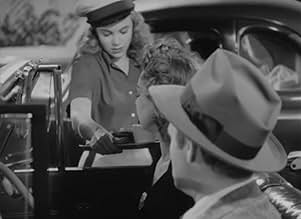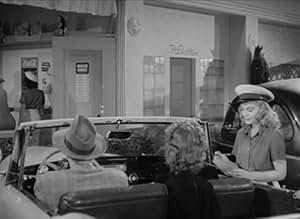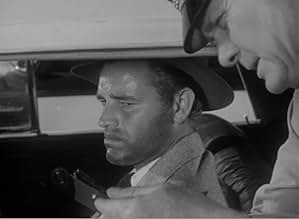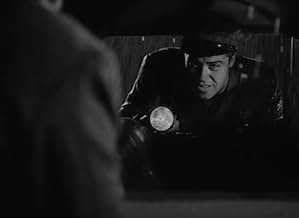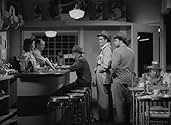ÉVALUATION IMDb
7,3/10
20 k
MA NOTE
Des événements aléatoires piègent Al Roberts dans une série de problèmes.Des événements aléatoires piègent Al Roberts dans une série de problèmes.Des événements aléatoires piègent Al Roberts dans une série de problèmes.
- Prix
- 1 victoire au total
Don Brodie
- Used Car Salesman
- (uncredited)
Roger Clark
- Cop
- (uncredited)
Harry Mayo
- Nightclub Patron
- (uncredited)
Harry Strang
- California Border Patrolman
- (uncredited)
Histoire
Le saviez-vous
- AnecdotesWhile the crew was setting up to film a hitchhiking scene, a passing car tried to pick up Ann Savage (made up to look dirty and disheveled), causing the crew to break out laughing.
- GaffesIn the first shots of Al hitchhiking, the film is reversed. The cars are driving on the wrong side of the highway and the drivers sitting behind the wheel are sitting on the right side of their vehicles.
- Citations
Al Roberts: Money. You know what that is, the stuff you never have enough of. Little green things with George Washington's picture that men slave for, commit crimes for, die for. It's the stuff that has caused more trouble in the world than anything else we ever invented, simply because there's too little of it.
- ConnexionsEdited into Michael Jackson's This Is It (2009)
- Bandes originalesI Can't Believe That You're in Love with Me
(uncredited)
Written by Jimmy McHugh and Clarence Gaskill
Performed by Claudia Drake
Played often in the score
Commentaire en vedette
One recurrent thought passes through my mind as I watch "Detour." It is that I do not believe a single moment of its story-telling. It isn't because of the incredible coincidences or the bitter irony but because of the simple goodness of the main character. Characters in film noir are not role models or good people placed into bad circumstances. They are bad people who believe that they're good.
The characters in "Double Indemnity," "Body Heat," or "The Talented Mr. Ripley" do not think of themselves as bad people. They believe they are forced into their crimes by the world, which is the essential difference between crime movies and noir. As pointed out by Roger Ebert: "the bad guys in crime movies know they're bad and want to be, while a noir hero thinks he's a good guy who has been ambushed by life."
"Detour" is told through the central character, Al Roberts, who recalls his story as one made through impossible coincidences and horrible luck. But there is something not right about his story. The audience can pick out the incongruities and flaws as soon as they're told. Was Charles Haskell's death really the result of bad luck or simply a murderer trying to convince himself that it was? We wonder if it is possible that a person as innocent as Al says he is can be forced into such immoral activities. However, the explanation is quite clear. Al is retelling the story not as a true confession but as a man reviewing his defense to the police.
Watching the movie, I was reminded of Tanazaki's "The Key," a novel in which the main character deliberately lies to the audience as a way of reaching the story's conclusion. We do not see a real conclusion to "Detour," but we sense that the police will find the same flaws in Al's story as we do. And that is not a fatal form of story-telling but a way of looking into the mind of a true noir character and seeing the darker depths of his soul. That is why film noir is so haunting and why this movie is so definitive in its genre.
The characters in "Double Indemnity," "Body Heat," or "The Talented Mr. Ripley" do not think of themselves as bad people. They believe they are forced into their crimes by the world, which is the essential difference between crime movies and noir. As pointed out by Roger Ebert: "the bad guys in crime movies know they're bad and want to be, while a noir hero thinks he's a good guy who has been ambushed by life."
"Detour" is told through the central character, Al Roberts, who recalls his story as one made through impossible coincidences and horrible luck. But there is something not right about his story. The audience can pick out the incongruities and flaws as soon as they're told. Was Charles Haskell's death really the result of bad luck or simply a murderer trying to convince himself that it was? We wonder if it is possible that a person as innocent as Al says he is can be forced into such immoral activities. However, the explanation is quite clear. Al is retelling the story not as a true confession but as a man reviewing his defense to the police.
Watching the movie, I was reminded of Tanazaki's "The Key," a novel in which the main character deliberately lies to the audience as a way of reaching the story's conclusion. We do not see a real conclusion to "Detour," but we sense that the police will find the same flaws in Al's story as we do. And that is not a fatal form of story-telling but a way of looking into the mind of a true noir character and seeing the darker depths of his soul. That is why film noir is so haunting and why this movie is so definitive in its genre.
- dxia
- 13 mars 2004
- Lien permanent
Meilleurs choix
Connectez-vous pour évaluer et surveiller les recommandations personnalisées
Détails
- Date de sortie
- Pays d’origine
- Sites officiels
- Langue
- Aussi connu sous le nom de
- Zaobilaznica
- Lieux de tournage
- Virginia Street, Reno, Nevada, ÉTATS-UNIS(In rear projection shot in opening scene, the Reno Arch is seen through the car's rear window.)
- société de production
- Consultez plus de crédits d'entreprise sur IMDbPro
Box-office
- Budget
- 30 000 $ US (estimation)
- Brut – États-Unis et Canada
- 16 172 $ US
- Fin de semaine d'ouverture – États-Unis et Canada
- 5 127 $ US
- 2 déc. 2018
- Brut – à l'échelle mondiale
- 16 172 $ US
- Durée1 heure 6 minutes
- Couleur
- Rapport de forme
- 1.37 : 1
Contribuer à cette page
Suggérer une modification ou ajouter du contenu manquant


![Regarder Trailer [OV]](https://m.media-amazon.com/images/M/MV5BZGEyYTUwNDQtN2ZjZi00YmY2LWE2ZjUtOTY3NjQ3NDQ0Zjg3XkEyXkFqcGdeQXRyYW5zY29kZS13b3JrZmxvdw@@._V1_QL75_UX500_CR0)
